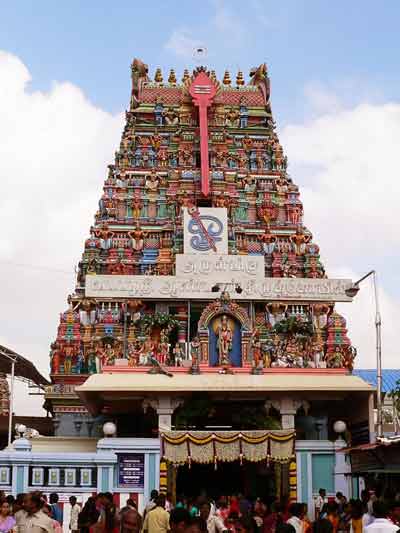 There are thousands of temples all over India in different size, shape and locations but not all of them are considered to be built in Vedic way. Generally, a temple should be located at a place where earth’s magnetic wave path passes through densely. It can be in the outskirts of a town/village or city, or in middle of the dwelling place, or on a hilltop. The essence of visiting a temple is discussed here.
There are thousands of temples all over India in different size, shape and locations but not all of them are considered to be built in Vedic way. Generally, a temple should be located at a place where earth’s magnetic wave path passes through densely. It can be in the outskirts of a town/village or city, or in middle of the dwelling place, or on a hilltop. The essence of visiting a temple is discussed here.
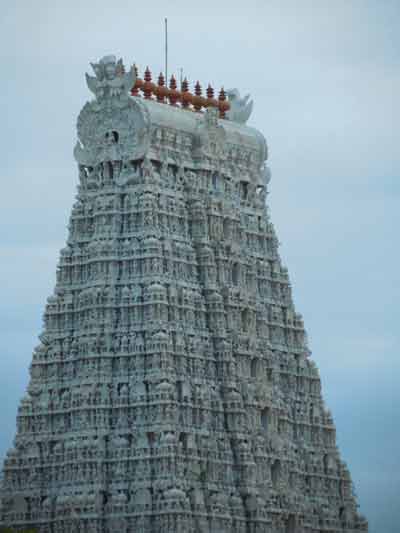 Temples are located strategically at a place where the positive energy is abundantly available from the magnetic and electric wave distributions of north/south pole thrust. The “Moolavar” (the idol of prime deity) is placed in the core center of the temple, known as *Garbhagriha* or *Moolasthanam*. In fact, the temple structure is built after the idol has been placed. This *Moolasthanam* is where earth’s magnetic waves are found to be maximum. We know that there are some copper plates, inscribed with Vedic scripts, buried beneath the “Moolavar” (the idol of prime deity).
Temples are located strategically at a place where the positive energy is abundantly available from the magnetic and electric wave distributions of north/south pole thrust. The “Moolavar” (the idol of prime deity) is placed in the core center of the temple, known as *Garbhagriha* or *Moolasthanam*. In fact, the temple structure is built after the idol has been placed. This *Moolasthanam* is where earth’s magnetic waves are found to be maximum. We know that there are some copper plates, inscribed with Vedic scripts, buried beneath the “Moolavar” (the idol of prime deity).
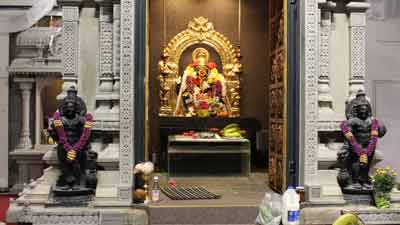
why we should visit temples ?
The copper plate absorbs earth’s magnetic waves and radiates it to the surroundings. Thus a person regularly visiting a temple and walking clockwise around the “Moolavar” receives the beamed magnetic waves and his body absorbs it. This is a very slow process and a regular visit will let him absorb more of this positive energy. Scientifically, it is the positive energy that we all require to have a healthy life.
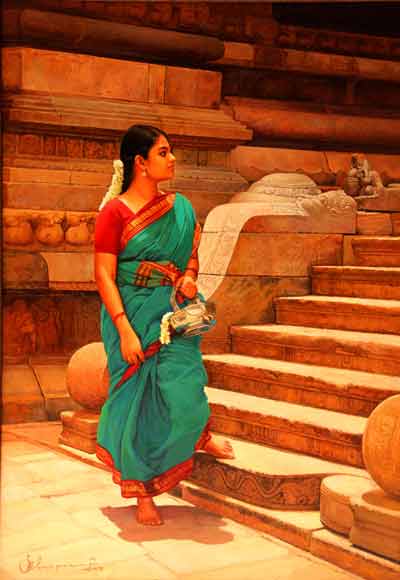
Scientific Reasons behind traditional values:
The basic ethics behind entering the temple without shirts(if men) and requested to wear more ornaments (if women) is maximum absorption of positive energy. Through jewels (metal) positive energy is absorbed. Also, it is a practice to leave newly purchased jewels at an idol’s feet and then wear them with the idol’s blessings. This act is now justified after reading this article. This act of “seeking divine blessings” before using any new article, like books or pens or automobiles may have stemmed from this through mere observation.
Energy lost in a day’s work is regained through a temple visit and one is refreshed slightly. The positive energy that is spread out in the entire temple and especially around where the “Moolavar” (the idol of prime deity) is placed, are simply absorbed by one’s body and mind. Did you know, every Vaishnava (Vishnu devotees), “must” visit a Vishnu temple twice every day in their location. Our practices are NOT some hard and fast rules framed by one man and his followers or God’s words in somebody’s dreams. All the rituals, all the practices are, in reality, well researched, studied and scientifically backed thesis which form the ways of nature to lead a good healthy life.
The scientific and research part of the practices are well camouflaged as “elder’s instructions” or “granny’s teaching’s” which should be obeyed as a mark of respect so as to once again, avoid stress to the mediocre “”brain septum” is closed on three sides. This increases the effect of all energies. The lamp that is lit radiates heat energy and also provides light inside the sanctum to the priests or poojaris performing the pooja. The ringing of the bells and the chanting of prayers takes a worshiper into trance, thus not letting his mind waver. When done in groups, this helps people forget personal problems for a while and relieve their stress. The fragrance from the flowers, the burning of camphor give out the chemical energy further aiding in a different good aura. The effect of all these energies is supplemented by the positive energy from the idol, the copper plates and utensils in the Moolasthanam / Garbagraham.
Theertham:
Theertham, the “holy water” used during the pooja to wash the idol is not plain water cleaning of an idol. It is a concoction of Cardamom,*Karpura* (Benzoin), zafron / saffron, *Tulsi* (Holy Basil), Clove, etc…Washing the idol is to charge the water with the magnetic radiations thus increasing its medicinal values. Three spoons of this holy water is distributed to devotees. Again, this water is mainly a source of magneto-therapy. Besides, the clove essence protects one from tooth decay, the saffron & *Tulsi* leafs protects one from common cold and cough, cardamom and *Pachha Karpuram* (benzoin), act as mouth fresheners. It is proved that *Theertham* is a very good blood purifier, as it is highly energized. Hence it is given as *prasadam* to the devotees. This way, one can claim to remain healthy by regularly visiting the Temples. This is why our elders used to suggest us to offer prayers at the temple so that you will be cured of many ailments. They were not always superstitious. Yes, in a few cases they did go overboard when due to ignorance they hoped many serious diseases could be cured at temples by deities. When people go to a temple for the *Deepaaraadhana*, and when the doors open up, the positive energy gushes out onto the persons who are there. The water that is sprinkled onto the assemblages passes on the energy to all.
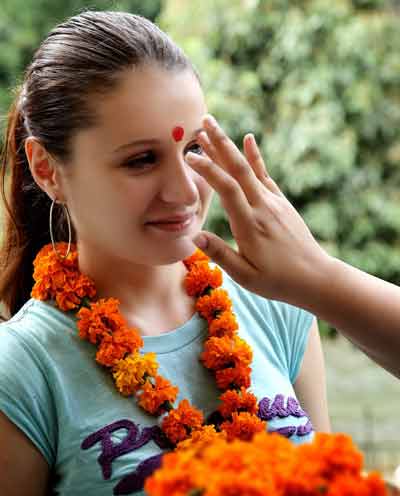
Thilak
Thilak is also considered as a “prasatham”. On the forehead, between the eyebrows, is a spot that is considered as a major nerve point in human body since ancient times. Thilak is believed to prevent the loss of “energy”, the red ‘kumkum’ between the eyebrows is said to retain energy in the human body and control the various levels of concentration. While applying kumkum the points on the mid-brow region and Adnya-chakra are automatically pressed. This also facilitates the blood supply to the face muscles. It is the reasons behind every hindu persons keep practicing this in home in day to day life.

















